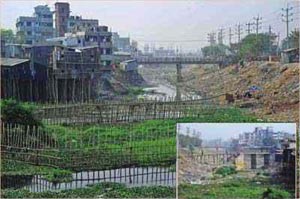Unabated encroachment, waste dumping leave it in a near-death condition
 The second channel of the Buriganga, which flows through the southwestern part of the capital, is almost dead due to wholesale encroachment by public and private organisations and also dumping of waste.
The second channel of the Buriganga, which flows through the southwestern part of the capital, is almost dead due to wholesale encroachment by public and private organisations and also dumping of waste.
Also known as Buriganga Morarkhari, the channel was originally around six kilometres long. But it has been reduced to half that length, thanks to the grabbing by local influential people over the last few years. As per the Environment Conservation Act 2010 (amendment), filling up wetlands without environmental clearance is a punishable offence.
Dumping of industrial and household wastes — both solid and liquid — has also heavily polluted its water, said leaders of Bangladesh Paribesh Andolon (Bapa) and Buriganga Riverkeeper at a press conference at the Jatiya Press Club yesterday.
According to a presentation by Bapa, water flow from the upstream has got reduced to a trickle. And that too is heavily polluted.
Sharif Jamil, founder of Buriganga Riverkeeper, presented satellite images showing how a station of the Power Development Board and buildings of Matador Company, Panna Group, several refuelling stations and other structures stand on the channel.
“In 2008, the channel was full of water. At that time, you saw structures of Shikder Group on it. Now you see a Rab-10 signboard in the middle of the channel near Amligola, claiming the ownership of the land,” he said.
In addition, the local government authorities have built a bridge encroaching on the channel at East Rasulpur, Sharif said.
Since its creation in the 1860s, the channel runs through Mohammadpur, Hazaribagh, Amligola and Lalbagh.
Our senior photojournalist Anisur Rahman yesterday visited certain stretches of the channel and talked to some locals who said the channel would be filled to the brim and trawlers would ply easily even two years ago.
But now, they add, the channel is completely blocked at six to seven points between Lalbagh and Rayerbazar.
Locals say whenever the media reports on the grabbing, the authorities rush to the spot and demolish some structures and evict the grabbers. But within a few days, the grabbers, many of them Awami League and BNP men, return to fill up the channel and erect structures again.
“One cannot recognise that it was once a river channel,” says a local, demanding strong action against the encroachers.
At the press conference, environment activists said tannery, dyeing and other factories in Old Dhaka continue to dump untreated waste in the channel. Dhaka Wasa and city corporation are also contributing to its pollution.
Sharif Jamil said the household wastes collected by the city corporation are being dumped in various canals and drains, which end up in the Buriganga channel.
“Death of a river destroys livelihoods of many people living by it,” he said, asking, “Who will protect the channel if Rab encroaches on it?”
The city dwellers will face water shortages if the channel eventually dies, other speakers said, adding that the authorities are busy doing their personal business instead of focusing on the issue.
On the one hand, India is blocking waters of the common rivers while on the other hand, the Bangladesh government is not doing enough to protect the existing rivers, they noted.
Bapa Joint Secretary Shahjahan Mridha Benu said not only the Buriganga but almost all the rivers in the country are drying.
Famed British chef of Bangladesh origin, Tommy Miah, expressed solidarity with the environment activists, saying he would create awareness at the global level for saving Bangladesh’s rivers.
Environmentalists demanded demarcation and dredging of the channel and demolishing the structures built on it, reconstruction of the bridge and ensuring treatment of industrial wastes before emptying those in the channel.
Courtesy of The Daily Star




















